Unit 1 Great Scientists Language points
文档属性
| 名称 | Unit 1 Great Scientists Language points |
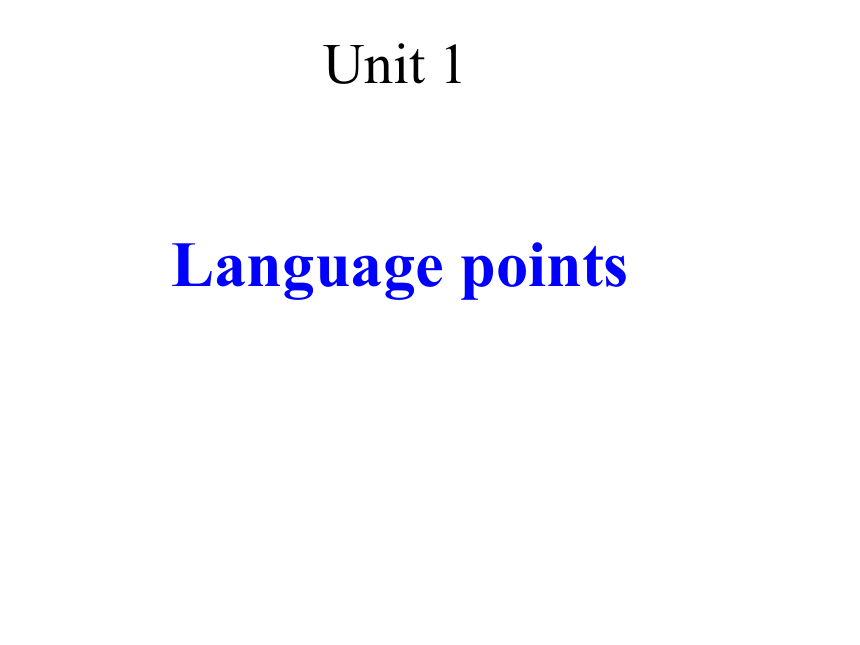
|
|
| 格式 | rar | ||
| 文件大小 | 265.9KB | ||
| 资源类型 | 教案 | ||
| 版本资源 | 人教版(新课程标准) | ||
| 科目 | 英语 | ||
| 更新时间 | 2010-01-01 00:00:00 | ||
图片预览

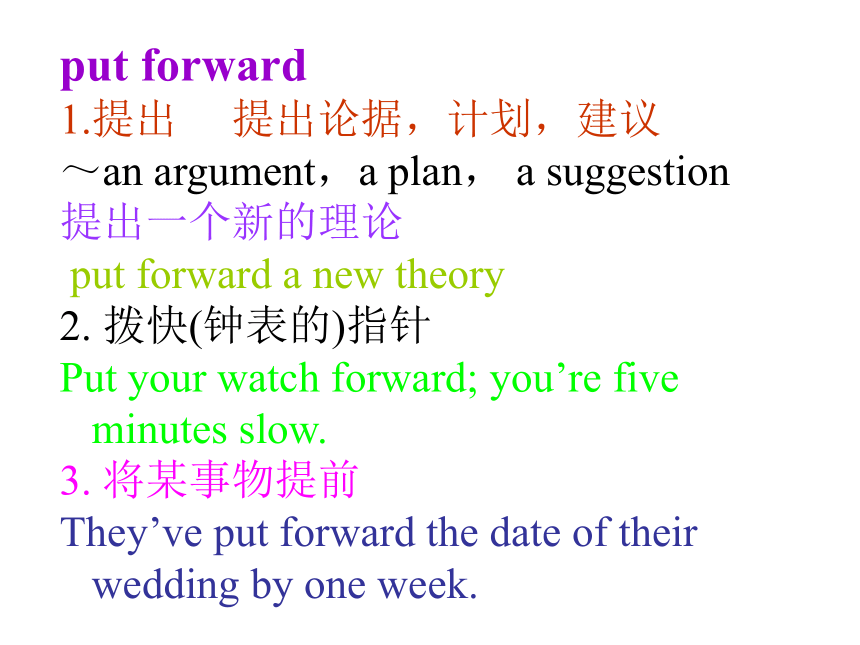
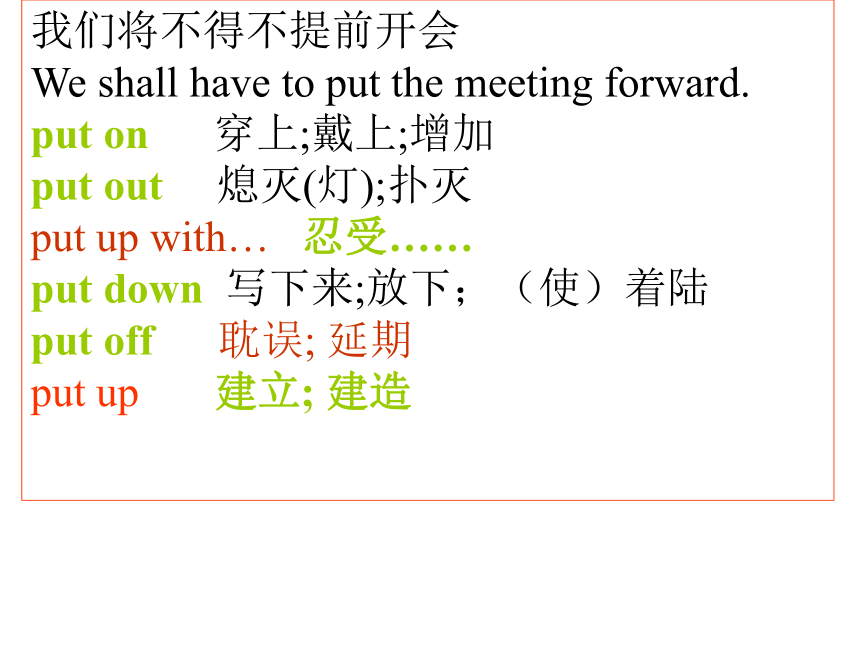
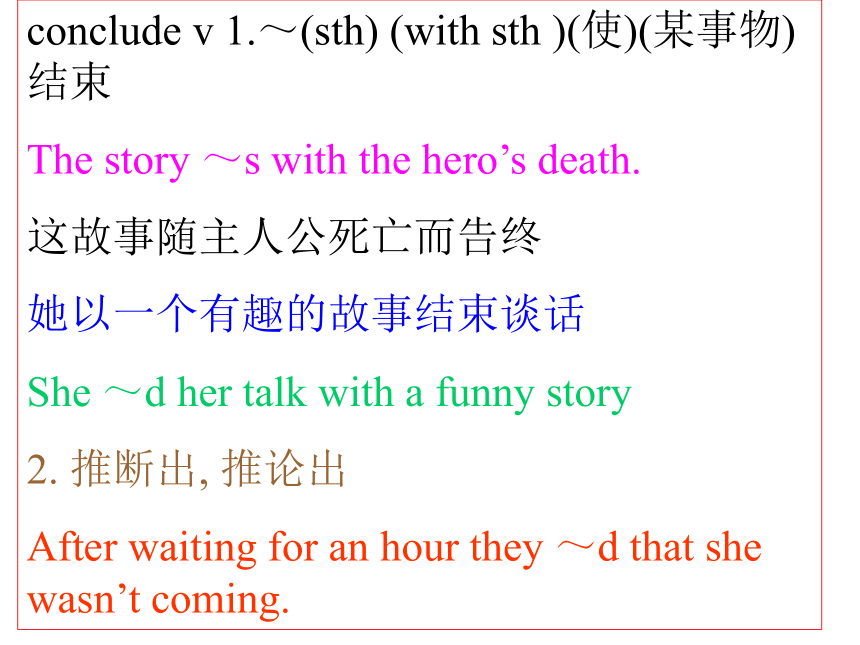
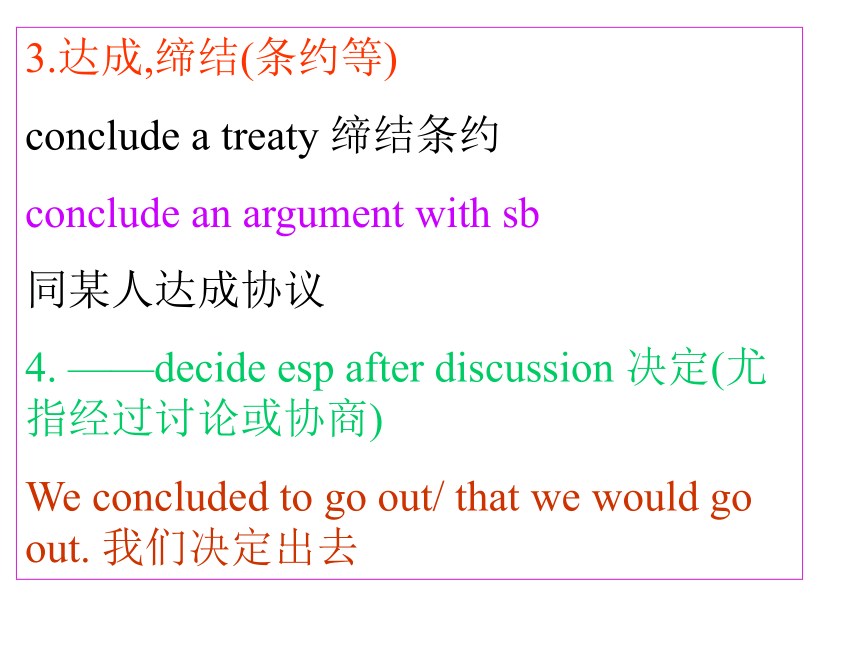
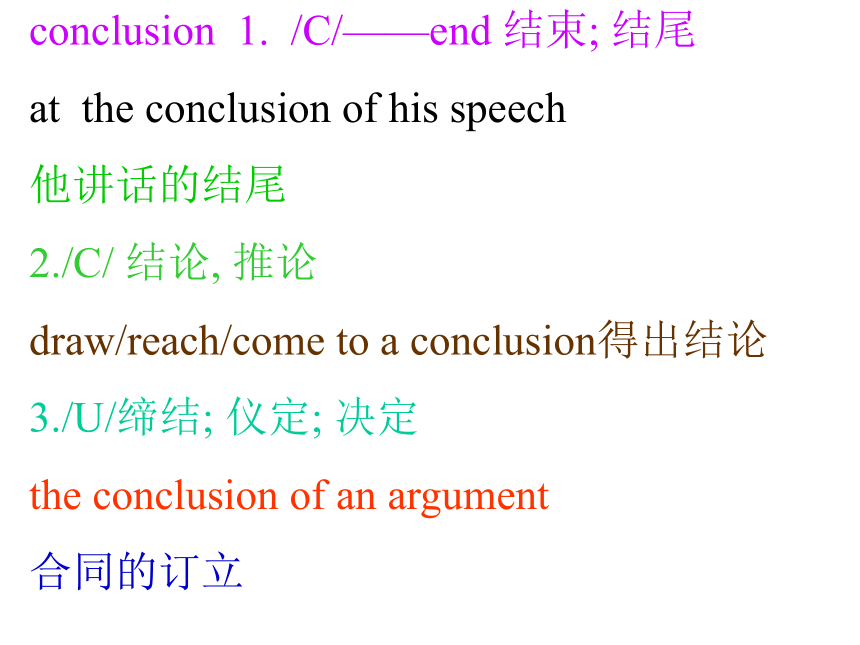
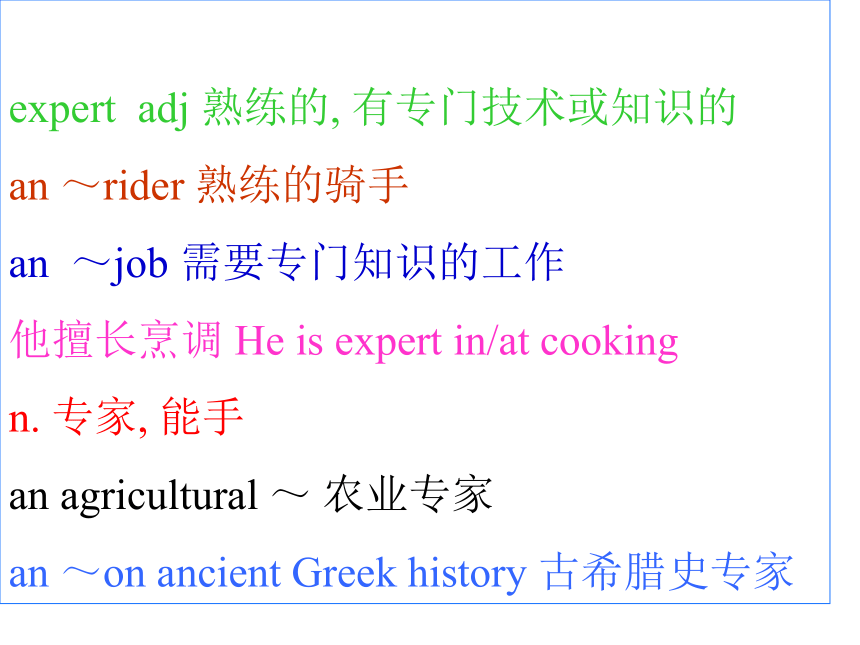
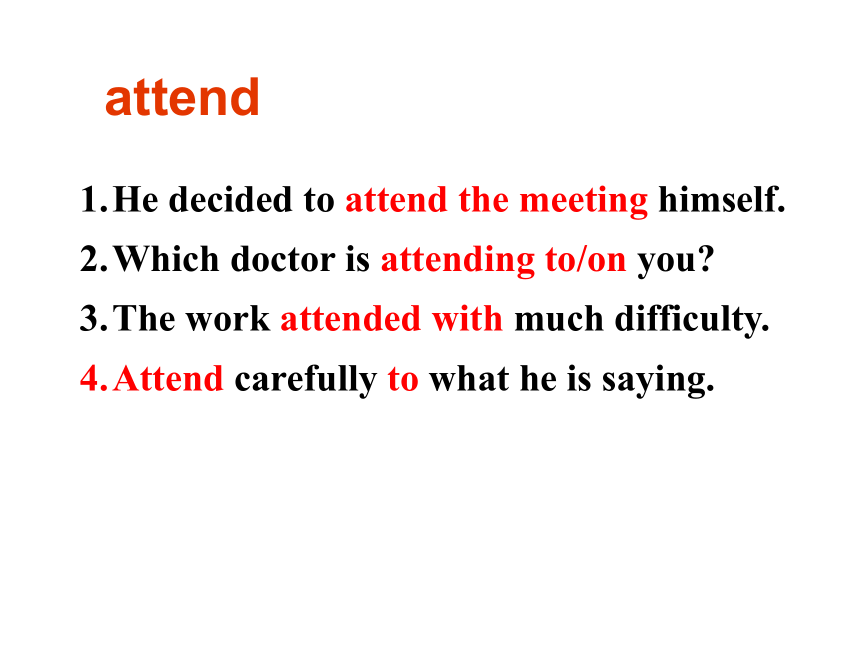
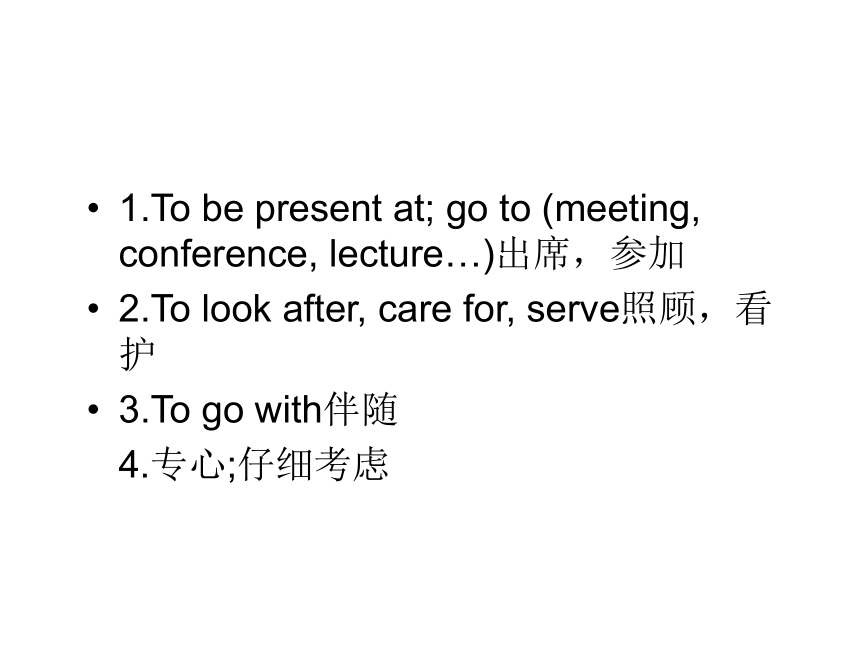
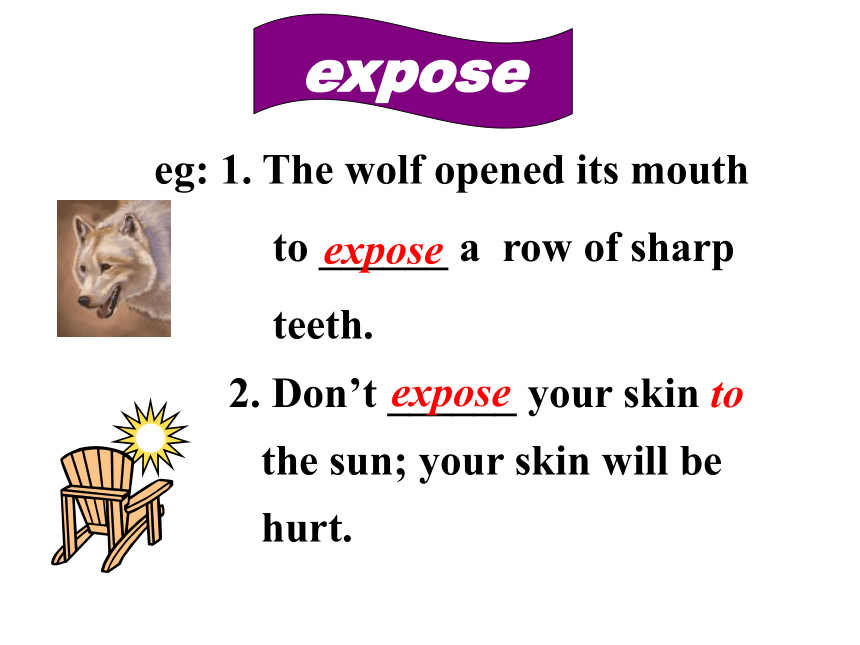
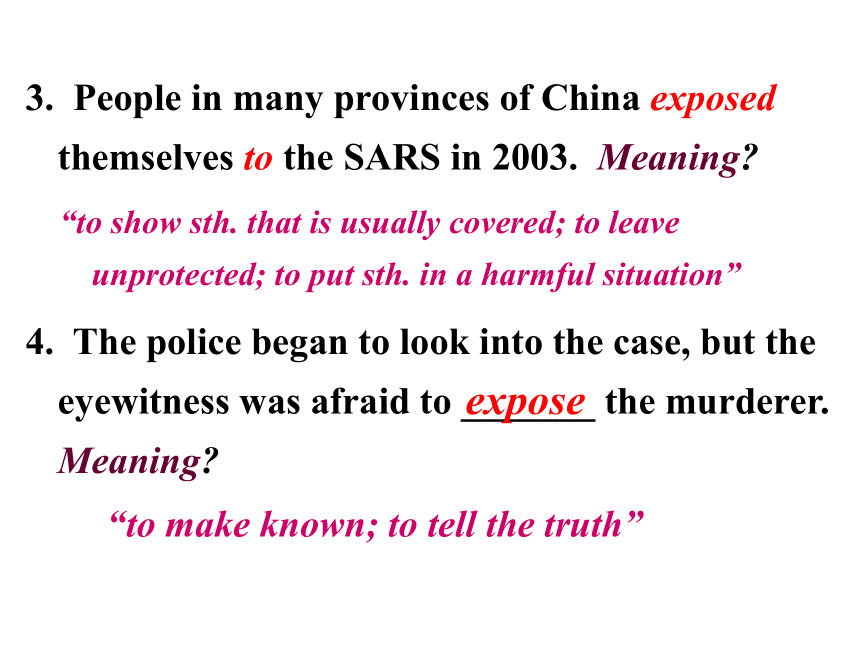
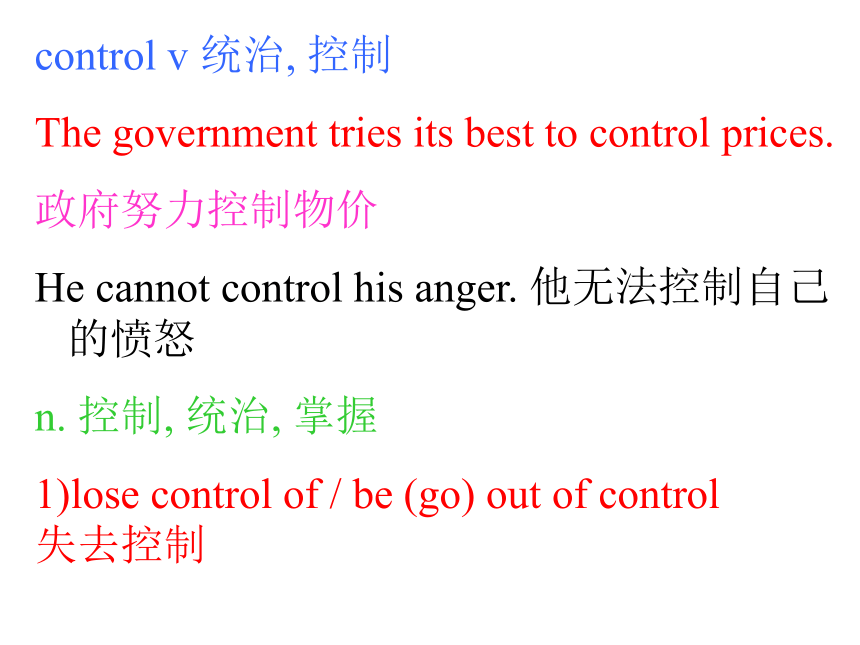
文档简介
课件54张PPT。 Unit 1 Language pointsput forward
1.提出 提出论据,计划,建议
~an argument,a plan, a suggestion
提出一个新的理论
put forward a new theory
2. 拨快(钟表的)指针
Put your watch forward; you’re five minutes slow.
3. 将某事物提前
They’ve put forward the date of their wedding by one week.我们将不得不提前开会
We shall have to put the meeting forward.
put on 穿上;戴上;增加
put out 熄灭(灯);扑灭 火)
put up with… 忍受……
put down 写下来;放下;(使)着陆
put off 耽误; 延期
put up 建立; 建造
conclude v 1.~(sth) (with sth )(使)(某事物)结束
The story ~s with the hero’s death.
这故事随主人公死亡而告终
她以一个有趣的故事结束谈话
She ~d her talk with a funny story
2. 推断出, 推论出
After waiting for an hour they ~d that she wasn’t coming.3.达成,缔结(条约等)
conclude a treaty 缔结条约
conclude an argument with sb
同某人达成协议
4. ——decide esp after discussion 决定(尤指经过讨论或协商)
We concluded to go out/ that we would go out. 我们决定出去conclusion 1. /C/——end 结束; 结尾
at the conclusion of his speech
他讲话的结尾
2./C/ 结论, 推论
draw/reach/come to a conclusion得出结论
3./U/缔结; 仪定; 决定
the conclusion of an argument
合同的订立
expert adj 熟练的, 有专门技术或知识的
an ~rider 熟练的骑手
an ~job 需要专门知识的工作
他擅长烹调 He is expert in/at cooking
n. 专家, 能手
an agricultural ~ 农业专家
an ~on ancient Greek history 古希腊史专家He decided to attend the meeting himself.
Which doctor is attending to/on you?
The work attended with much difficulty.
Attend carefully to what he is saying.attend1.To be present at; go to (meeting, conference, lecture…)出席,参加
2.To look after, care for, serve照顾,看护
3.To go with伴随
4.专心;仔细考虑eg: 1. The wolf opened its mouth
to ______ a row of sharp
teeth.2. Don’t ______ your skin to the sun; your skin will be hurt.exposeexposeexpose3. People in many provinces of China exposed themselves to the SARS in 2003. Meaning?“to show sth. that is usually covered; to leave unprotected; to put sth. in a harmful situation”4. The police began to look into the case, but the eyewitness was afraid to _______ the murderer. Meaning?expose“to make known; to tell the truth”control v 统治, 控制
The government tries its best to control prices.
政府努力控制物价
He cannot control his anger. 他无法控制自己的愤怒
n. 控制, 统治, 掌握
lose control of / be (go) out of control
失去控制The driver lost control of his car and it knocked into a tree.
司机失去控制, 车撞到树上
The car was out of control and ran into a tree.车失去控制, 撞到树上
2)in control of 在……控制下
Mr Brown is in control of the money
……掌管钱财
3)under the control of被……控制着
the money is under the control of Mr Brown
钱财由……掌管
cure v 1. ~sb (of sth)——make sb heathy again 治愈某人
医生治好了她的癌症
The doctor cured her of her cancer.
2. ~sb (of sth)——矫正某人的不良行为
父母总是试图改正孩子们的坏习惯
Parents try to ~their children of bad habits.
n. 1./C/治疗;治愈a complete cure 完全治愈
2. /C/疗法
饮食疗法 a diet ~
3. /U/(有治愈疗效的)药
治感冒没有特效药物
There is no cure for the common cold.
6. suggest
* She suggested a picnic at the weekend.
I suggested leaving early for the airport.
*She suggested that her father (should)
give up smoking.
*The smile on her face suggested
that she agreed with me.
他建议我们参观长城。
He suggested to us a visit to the Great Wall.
He suggested us visiting the Great Wall.
He suggested that we (should) visit the Great Wall. Clever children absorb knowledge easily.
The little girl was absorbed in reading a tale.
The writer was so absorbed in his writing that he forgot to flick the ashes from his cigar.
Chinese history absorbs his attention recently.absorbbe absorbed in = concentrate onsuspect v
~sb of (sth/doing sth)怀疑某人有某罪
He was suspected of theft.
severe adj
1.严重的;剧烈的
severe pain, injures 剧痛, 重伤
2.严格的;严厉的~(on/with sb/sth)
He is very severe with his children.A. unpleasant or dangerous weather
B. very strict
C. very bad or serious to worry about
D. extreme criticism or punishment Q: Which of the following definitions is suitable for each sentence?1. He has such a severe illness that he has been in hospital.
2. I was caught in a severe storm last night and couldn’t go back home in time.
3. Come on! Don’t be so severe with the children.
4. His report contains severe criticism of the company’s actions.
CABD泵 (油泵; 气泵), 抽水机, 打气筒pump If have a flat tyre, you will pump air into the tyre. (You will pump up your tyre.)
When my car was short of gas, I went to the gas station, where the guy pumped gas .
We had a debate yesterday. The lively debate really
pumped us up.
4. His heart was pumping fast.
During the drought last year, the villagers had
pumped the well dry, but got no more water.pumpforesee(pt foresaw,pp foreseen)
—— see or know that sth is going to happen in the future; predict
预见;预知;预料
They could not have foreseen how things would turn out
他们不可能预知事情的结果blame
1.blame sb(for sth)/~sth on sb
—— consider or say that sb is responsible for sth done(badly or wrongly)or not done责备;责怪;指责;埋怨;归咎于
她把婚姻的触礁归咎于他
She blamed him for the failure of their marriage/ blamed the failure of their marriage on him.
2.be to blame: be responsible for sth. bad
eg. The driver was not to blame for the traffic accident.
n./U/~(for sth)(对做坏的或做错的事所负的)责任
bear/take/accept/get the blame(for sth)
(对某事)承担责任
eg. He is ready to take the blame for what had happened.handle8handle v.Choose the Chinese explanations in the box.1. Ms Hawkins, the chief accountant of the company handles the company's accounts.2. The children are so naughty that I can't handle them.
3. She handled a difficult argument skillfully.CFE4. Handle children kindly, if you want them to trust you.
5. This shop handles paper and stationery.
6. He learnt how to handle the axe.DBA2. The two towns are linked
by a railway. 1. A lot of links fitted together form a chain. 3. The new bridge will link the island to the mainland.link94. 研究人员发现了吸烟和心脏病之间的关系。
Researchers have detected a link between smoking and heart disease.9die of 的意思是“因……而死”,常表示由于疾病、饥饿、年老、情感等原因引起的死亡。例如:
He died of old age. 他寿终正寝了。
In a cold winter, many wild animals may die of hunger. 在严寒的冬天,很多野生动物可能饿死。
The old woman died of grief soon after her husband's death. 那位老太太在丈夫去世后不久因悲伤而死。
die from的意思是“因……而死”,但一般指因疾病或感情以外的原因而造成的死亡,例如:
He died from a chest wound. 他因胸部受伤而死。
We felt sad at his death because he died from overwork. 我们对他的死感到悲伤,他是因过度工作累死的。announce v 1——make (sth) known publicly宣布; 宣告; 发表
The news was announced to the public on TV.这则消息经由电视向大众宣布
2.——make known the presence or arrival of (sb/sth)通报(某人/某事物)的出席或到来
His servant announced Mr and Mrs White.
他的仆人通报怀特夫妇驾临1). -- Who instructs your class in history?
-- Mr Black. He is our instructor.
2). She instructed me in the use of this telephone.
instructor.——person who instructs
教员;教练;指导者1.——to teach ~sb (in sth)
教,讲授;训练;指导
instruct2.——to order指示;命令;吩咐
3). 医生嘱咐他卧床休息
The doctor instructed him to go to bed and restdetailed directions on procedure; an order; teaching
instruction1. The boss gave me so many instructions at one time that I got muddled up.
2. We forgot to read the instructions. (an instruction book)
3. Under Berry’s instruction, I slowly mastered the art of glass blowing.construct vt建设;建筑
~a factory
construction.
@ 建造,建筑,建设
The construction of a large bridge takes about two years.
@ 结构
这个图显示了细胞的结构。
The diagram shows the construction of a cell.
The sentence construction was strange.under construction 正在修建中…
Most of the buildings under construction have
been designed by Chinese engineers.B4.contribute.
# 贡献古代中国人为世界贡献了四大发明。 The old Chinese people contributed four
inventions for the world.# 捐献,捐助The Chinese people contributes 50
million yuan for the people who
suffered tsunami.#~(sth) to sth撰稿;投稿
给报纸撰稿
contribute (articles) to newspapers
# contribute to . 有助于, 促成(某事物)
Plenty of fresh air contributes to good health
The drivers carelessness contributed to the accident.
contribution n.
1./U/捐款;捐助;贡献;投稿
2./C/捐赠物;稿件apart from =besides,=except forin addition to 1.他除了鼻子之外,哪儿都好看
Apart from his nose, he’s quite good-looking.
2. I’ve finished apart from the last question.
3. 他除了脸部和双手受伤之外,两条腿也断了
Apart from the injuries to his face and hands, he broke both legs.two more. 再,另… 数词+more another + 数词 数词+ otherlead to 引起, 导致, 通向
Too much work and too little rest often
lead to illness.
这个大学的学生都在学取得学位的课程。
The students in the college are all taking
courses leading to a degree.
All roads lead to Rome.
lead 带路
She led a blind man across the street. The discovery of new evidence led to _______.
A. the thief having caught
B. catch the thief
C. the thief being caught
D. the thief to be caughtConly +状语 放句首, 句子部分倒装Only then did I realize the importance
of knowledge.
Only with hard work can you expect to get
a pay rise
Only when the war was over did Einstein begin
his research workmake sense: 1.讲得通;有意义;有道理
This sentence doesn’t make any sense .
这个句子完全讲不通。
2.——be sensible 言之有理, 是合情合理的, 是明智的
This plan made sense.这项计划是合情合理的
It makes sense to take care of your health.
make sense of 理解,弄懂……的意思
你看得懂这首诗吗?
Can you make sense of this poem?arise arose arisen
1.呈现; 出现;发生
A new difficulty has arisen.
出现了新困难
2. ~out of/from sth
由……引起,由……产生
他的病是营养不良引起的
His illness arose from malnutrition
at times =
a little now and then
sometimes
from time to time
occasionally at times = sometimes
at a time
at one time
(at) any time
at no time
at the same time有时,不时一次,每次曾经,一度随时,在任何时候决不,在任何时候都不同时,然而 work on 从事于, 致力于 I’m working on a new novel.
work out 1. 想出; 制订出; 产生出
~a method ~a plan
2. 解决 ~difficulties
3. 计算 ~one’s tax 计算税款
4. 理解, 弄懂; 知道
I can’t work out the meaning of this poem5. 产生结果; 发展; 成功
Things turned out quite differently.
结果情况大不相同
6.锻炼,训练
He works out with the team three times a week.
We didn’t plan our art exhibition like that
but it _____ very well.
A. worked out B. tired C. went over D. carried outenthusiastic adj ~about/over sth/sb——
full of enthusiasm热情的; 热心的
她非常喜欢唱歌
She’s very ~about singing
enthusiasm n1./U/热爱;热心;热情
2./C/热中的事物cautious adj ~(about/of sb/sth)
——careful
reject.
@ refuse to accept 拒绝,不肯接受~a gift, an opinion, a suggestionHe rejected our help.He wanted to join the army but was rejected.@ 抛弃,扔掉
The farmer had to rejected some
fruit that was overripe.
He rejected some old books.goodbye
1.提出 提出论据,计划,建议
~an argument,a plan, a suggestion
提出一个新的理论
put forward a new theory
2. 拨快(钟表的)指针
Put your watch forward; you’re five minutes slow.
3. 将某事物提前
They’ve put forward the date of their wedding by one week.我们将不得不提前开会
We shall have to put the meeting forward.
put on 穿上;戴上;增加
put out 熄灭(灯);扑灭 火)
put up with… 忍受……
put down 写下来;放下;(使)着陆
put off 耽误; 延期
put up 建立; 建造
conclude v 1.~(sth) (with sth )(使)(某事物)结束
The story ~s with the hero’s death.
这故事随主人公死亡而告终
她以一个有趣的故事结束谈话
She ~d her talk with a funny story
2. 推断出, 推论出
After waiting for an hour they ~d that she wasn’t coming.3.达成,缔结(条约等)
conclude a treaty 缔结条约
conclude an argument with sb
同某人达成协议
4. ——decide esp after discussion 决定(尤指经过讨论或协商)
We concluded to go out/ that we would go out. 我们决定出去conclusion 1. /C/——end 结束; 结尾
at the conclusion of his speech
他讲话的结尾
2./C/ 结论, 推论
draw/reach/come to a conclusion得出结论
3./U/缔结; 仪定; 决定
the conclusion of an argument
合同的订立
expert adj 熟练的, 有专门技术或知识的
an ~rider 熟练的骑手
an ~job 需要专门知识的工作
他擅长烹调 He is expert in/at cooking
n. 专家, 能手
an agricultural ~ 农业专家
an ~on ancient Greek history 古希腊史专家He decided to attend the meeting himself.
Which doctor is attending to/on you?
The work attended with much difficulty.
Attend carefully to what he is saying.attend1.To be present at; go to (meeting, conference, lecture…)出席,参加
2.To look after, care for, serve照顾,看护
3.To go with伴随
4.专心;仔细考虑eg: 1. The wolf opened its mouth
to ______ a row of sharp
teeth.2. Don’t ______ your skin to the sun; your skin will be hurt.exposeexposeexpose3. People in many provinces of China exposed themselves to the SARS in 2003. Meaning?“to show sth. that is usually covered; to leave unprotected; to put sth. in a harmful situation”4. The police began to look into the case, but the eyewitness was afraid to _______ the murderer. Meaning?expose“to make known; to tell the truth”control v 统治, 控制
The government tries its best to control prices.
政府努力控制物价
He cannot control his anger. 他无法控制自己的愤怒
n. 控制, 统治, 掌握
lose control of / be (go) out of control
失去控制The driver lost control of his car and it knocked into a tree.
司机失去控制, 车撞到树上
The car was out of control and ran into a tree.车失去控制, 撞到树上
2)in control of 在……控制下
Mr Brown is in control of the money
……掌管钱财
3)under the control of被……控制着
the money is under the control of Mr Brown
钱财由……掌管
cure v 1. ~sb (of sth)——make sb heathy again 治愈某人
医生治好了她的癌症
The doctor cured her of her cancer.
2. ~sb (of sth)——矫正某人的不良行为
父母总是试图改正孩子们的坏习惯
Parents try to ~their children of bad habits.
n. 1./C/治疗;治愈a complete cure 完全治愈
2. /C/疗法
饮食疗法 a diet ~
3. /U/(有治愈疗效的)药
治感冒没有特效药物
There is no cure for the common cold.
6. suggest
* She suggested a picnic at the weekend.
I suggested leaving early for the airport.
*She suggested that her father (should)
give up smoking.
*The smile on her face suggested
that she agreed with me.
他建议我们参观长城。
He suggested to us a visit to the Great Wall.
He suggested us visiting the Great Wall.
He suggested that we (should) visit the Great Wall. Clever children absorb knowledge easily.
The little girl was absorbed in reading a tale.
The writer was so absorbed in his writing that he forgot to flick the ashes from his cigar.
Chinese history absorbs his attention recently.absorbbe absorbed in = concentrate onsuspect v
~sb of (sth/doing sth)怀疑某人有某罪
He was suspected of theft.
severe adj
1.严重的;剧烈的
severe pain, injures 剧痛, 重伤
2.严格的;严厉的~(on/with sb/sth)
He is very severe with his children.A. unpleasant or dangerous weather
B. very strict
C. very bad or serious to worry about
D. extreme criticism or punishment Q: Which of the following definitions is suitable for each sentence?1. He has such a severe illness that he has been in hospital.
2. I was caught in a severe storm last night and couldn’t go back home in time.
3. Come on! Don’t be so severe with the children.
4. His report contains severe criticism of the company’s actions.
CABD泵 (油泵; 气泵), 抽水机, 打气筒pump If have a flat tyre, you will pump air into the tyre. (You will pump up your tyre.)
When my car was short of gas, I went to the gas station, where the guy pumped gas .
We had a debate yesterday. The lively debate really
pumped us up.
4. His heart was pumping fast.
During the drought last year, the villagers had
pumped the well dry, but got no more water.pumpforesee(pt foresaw,pp foreseen)
—— see or know that sth is going to happen in the future; predict
预见;预知;预料
They could not have foreseen how things would turn out
他们不可能预知事情的结果blame
1.blame sb(for sth)/~sth on sb
—— consider or say that sb is responsible for sth done(badly or wrongly)or not done责备;责怪;指责;埋怨;归咎于
她把婚姻的触礁归咎于他
She blamed him for the failure of their marriage/ blamed the failure of their marriage on him.
2.be to blame: be responsible for sth. bad
eg. The driver was not to blame for the traffic accident.
n./U/~(for sth)(对做坏的或做错的事所负的)责任
bear/take/accept/get the blame(for sth)
(对某事)承担责任
eg. He is ready to take the blame for what had happened.handle8handle v.Choose the Chinese explanations in the box.1. Ms Hawkins, the chief accountant of the company handles the company's accounts.2. The children are so naughty that I can't handle them.
3. She handled a difficult argument skillfully.CFE4. Handle children kindly, if you want them to trust you.
5. This shop handles paper and stationery.
6. He learnt how to handle the axe.DBA2. The two towns are linked
by a railway. 1. A lot of links fitted together form a chain. 3. The new bridge will link the island to the mainland.link94. 研究人员发现了吸烟和心脏病之间的关系。
Researchers have detected a link between smoking and heart disease.9die of 的意思是“因……而死”,常表示由于疾病、饥饿、年老、情感等原因引起的死亡。例如:
He died of old age. 他寿终正寝了。
In a cold winter, many wild animals may die of hunger. 在严寒的冬天,很多野生动物可能饿死。
The old woman died of grief soon after her husband's death. 那位老太太在丈夫去世后不久因悲伤而死。
die from的意思是“因……而死”,但一般指因疾病或感情以外的原因而造成的死亡,例如:
He died from a chest wound. 他因胸部受伤而死。
We felt sad at his death because he died from overwork. 我们对他的死感到悲伤,他是因过度工作累死的。announce v 1——make (sth) known publicly宣布; 宣告; 发表
The news was announced to the public on TV.这则消息经由电视向大众宣布
2.——make known the presence or arrival of (sb/sth)通报(某人/某事物)的出席或到来
His servant announced Mr and Mrs White.
他的仆人通报怀特夫妇驾临1). -- Who instructs your class in history?
-- Mr Black. He is our instructor.
2). She instructed me in the use of this telephone.
instructor.——person who instructs
教员;教练;指导者1.——to teach ~sb (in sth)
教,讲授;训练;指导
instruct2.——to order指示;命令;吩咐
3). 医生嘱咐他卧床休息
The doctor instructed him to go to bed and restdetailed directions on procedure; an order; teaching
instruction1. The boss gave me so many instructions at one time that I got muddled up.
2. We forgot to read the instructions. (an instruction book)
3. Under Berry’s instruction, I slowly mastered the art of glass blowing.construct vt建设;建筑
~a factory
construction.
@ 建造,建筑,建设
The construction of a large bridge takes about two years.
@ 结构
这个图显示了细胞的结构。
The diagram shows the construction of a cell.
The sentence construction was strange.under construction 正在修建中…
Most of the buildings under construction have
been designed by Chinese engineers.B4.contribute.
# 贡献古代中国人为世界贡献了四大发明。 The old Chinese people contributed four
inventions for the world.# 捐献,捐助The Chinese people contributes 50
million yuan for the people who
suffered tsunami.#~(sth) to sth撰稿;投稿
给报纸撰稿
contribute (articles) to newspapers
# contribute to . 有助于, 促成(某事物)
Plenty of fresh air contributes to good health
The drivers carelessness contributed to the accident.
contribution n.
1./U/捐款;捐助;贡献;投稿
2./C/捐赠物;稿件apart from =besides,=except forin addition to 1.他除了鼻子之外,哪儿都好看
Apart from his nose, he’s quite good-looking.
2. I’ve finished apart from the last question.
3. 他除了脸部和双手受伤之外,两条腿也断了
Apart from the injuries to his face and hands, he broke both legs.two more. 再,另… 数词+more another + 数词 数词+ otherlead to 引起, 导致, 通向
Too much work and too little rest often
lead to illness.
这个大学的学生都在学取得学位的课程。
The students in the college are all taking
courses leading to a degree.
All roads lead to Rome.
lead 带路
She led a blind man across the street. The discovery of new evidence led to _______.
A. the thief having caught
B. catch the thief
C. the thief being caught
D. the thief to be caughtConly +状语 放句首, 句子部分倒装Only then did I realize the importance
of knowledge.
Only with hard work can you expect to get
a pay rise
Only when the war was over did Einstein begin
his research workmake sense: 1.讲得通;有意义;有道理
This sentence doesn’t make any sense .
这个句子完全讲不通。
2.——be sensible 言之有理, 是合情合理的, 是明智的
This plan made sense.这项计划是合情合理的
It makes sense to take care of your health.
make sense of 理解,弄懂……的意思
你看得懂这首诗吗?
Can you make sense of this poem?arise arose arisen
1.呈现; 出现;发生
A new difficulty has arisen.
出现了新困难
2. ~out of/from sth
由……引起,由……产生
他的病是营养不良引起的
His illness arose from malnutrition
at times =
a little now and then
sometimes
from time to time
occasionally at times = sometimes
at a time
at one time
(at) any time
at no time
at the same time有时,不时一次,每次曾经,一度随时,在任何时候决不,在任何时候都不同时,然而 work on 从事于, 致力于 I’m working on a new novel.
work out 1. 想出; 制订出; 产生出
~a method ~a plan
2. 解决 ~difficulties
3. 计算 ~one’s tax 计算税款
4. 理解, 弄懂; 知道
I can’t work out the meaning of this poem5. 产生结果; 发展; 成功
Things turned out quite differently.
结果情况大不相同
6.锻炼,训练
He works out with the team three times a week.
We didn’t plan our art exhibition like that
but it _____ very well.
A. worked out B. tired C. went over D. carried outenthusiastic adj ~about/over sth/sb——
full of enthusiasm热情的; 热心的
她非常喜欢唱歌
She’s very ~about singing
enthusiasm n1./U/热爱;热心;热情
2./C/热中的事物cautious adj ~(about/of sb/sth)
——careful
reject.
@ refuse to accept 拒绝,不肯接受~a gift, an opinion, a suggestionHe rejected our help.He wanted to join the army but was rejected.@ 抛弃,扔掉
The farmer had to rejected some
fruit that was overripe.
He rejected some old books.goodbye
